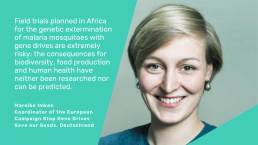Interview with Mareike Imken
Gene drive technology carries high risks. Yet it is being promoted by the Bill & Melinda Gates Foundation as a solution to malaria. On the occasion of World Malaria Day, the Stop Gene Drives campaign is launching a project that presents different perspectives on the issue of malaria control and presents alternative, possibly less risky approaches and innovations to combat malaria.
In this interview Mareike Imken, coordinator of the European Stop Gene Drives Campaign explains the reasoning behind this project.
Ms. Imken, why does the Stop Gene Drive Campaign provide information about malaria control options?
As part of the Stop Gene Drive campaign, we want to help decision-makers and the general public to classify the risks and potential of gene drive technology in contrast to alternative measures and innovations for malaria control. To this end, we will present different approaches and perspectives on malaria control throughout 2021.
What does Gene Drive technology have to do with malaria?
Gene Drive technology aims to genetically modify or eradicate the malaria-carrying Anopheles mosquito. The Bill & Melinda Gates Foundation in particular is pushing ahead into this technology as part of its „Target Malaria“ program. The first field trials could take place in Burkina Faso, Mali, Uganda and Ghana in the next 5-10 years. But such release trials carry high risks: Even small-scale release trials could result in irreversible genetic modification or eradication of wild mosquito populations. However, the consequences for the environment, biodiversity, food production, and human health are neither studied nor foreseeable.
What is the goal of the Stop Gene Drive campaign?
With the Stop Gene Drive campaign, we want to stimulate a broad social debate about the fundamental intervention in nature that would be associated with the application of gene drive technology. We need time for such a fundamental debate instead of being presented with a fait accompli in the next few years. That is why a broad alliance of civil society organizations in the EU and worldwide is calling for a global moratorium on release trials of genetically modified Gene Drive mosquitoes. Such a moratorium would buy humanity time to meet minimum requirements for the use of such a high-risk technology. That is, model the risks of the technology in the laboratory and weigh them against the risks and benefits of alternative measures. In addition, establish the international regulations and decision-making procedures that have been lacking to date.
—
These are the interviews on the topic held so far with the following experts:
Andreas Wulf, physician and expert for global health policy at Medico International in the Berlin office, provides his views on the role of the Bill & Melinda Gates Foundation in international health policy and his outlook on necessary conditions for the implementation of the human right to health in Africa.
Click here for the interview
Ali Tapsoba de Goamma, human rights activist, and spokesman for an alliance in Burkina Faso against the release of Gene Drive mosquitoes in his home country, on the malaria control measures implemented so far and the attitude of the local population towards the planned field trials with Gene Drive mosquitoes.
Click here for the interview
Pamela J. Weathers, professor and researcher at Worcester Polytechnic Institute in Massachusetts, USA, on the efficacy and controversial safety of Artemisia tea infusions for treating or preventing malaria.
Click here for the interview
Arnaud Nouvion, consultant and Lucile Cornet-Vernet, co-founder of La Maison de L’Artémisia, describe the potential benefits of the Artémisia plant and state that more funding is needed to conduct clinical studies, proving once and for all that the plant is a great tool in the fight against malaria.
Click here for the interview
More interviews to follow.

